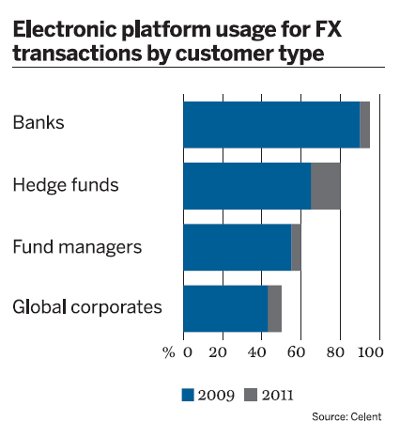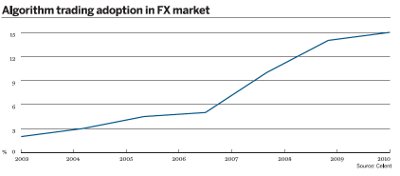The question of how to stay ahead when it comes to trading in foreign exchange boils down to one question: how deep are your pockets? The revolution in e-commerce - combined with an increasingly demanding client base and the rigours of potential new regulation - means that banks will have to work harder than ever before to maintain market share. Writer Charlie Corbett
If you speak to any head of foreign exchange (FX) trading today the first sentence they will utter, shortly after hello, will contain some form of military analogy. The talk will be of technological 'arms races', e-commerce 'warfare' or 'drawing up the battle lines' to win market share. The FX market is not just in a state of flux, but a state of open battle.
Once a purely phone-based market dominated by corporations hedging their currency exposures and banks' proprietary trading, technological advances have led to an explosion in FX volumes. When it comes to the inexorable rise in technological innovation, the global economic crisis can be seen as merely a sideshow. The transparency and liquidity of the global FX market meant that it thrived during the crisis in financial markets and it has firmly established itself as an asset class in its own right. The rise in the use of algorithms in FX trading, once exclusive to the equity market, is one proof of the changing nature of the market.
Such change has led to more and diverse participants, such as hedge funds and retail customers, and to increasing demands from clients for advanced pre- and post-execution services and a focus on good risk management. Clients no longer just want basic execution services and price discovery, they want the whole gamut of products and services that a bank can provide. Offering such a wide range of services does not come cheap.
Power shift
In terms of trading, the competitive landscape has changed beyond recognition over the past three to four years. Sell-side banks are spending quite literally billions of dollars in their attempts to win market share and optimise the opportunities that technology will bring.
François Boisson, head of FX sales at BNP Paribas, represents just one of many sell-side banks that are preparing themselves for battles to come. "We've been undergoing a revolution at BNP Paribas for the past 18 months," he says. "The FX markets are changing considerably. A massive shift of powers has been taking place since the crisis hit." E-commerce, Mr Boisson says, lies at the heart of that revolution. "We've lagged in the past, but the time has come for us to catch up." According to the latest figures from financial services consultant Greenwich Associates, more than 90% of banks active in FX markets now trade electronically and the share of fund managers and pension funds using eFX increased to 62% in 2009 from 57% in 2008.
Competition is cut-throat and only the biggest can survive. According to Celent, a banking IT research and consulting firm, the top two bank players in the FX market, Deutsche Bank and UBS, have a market share of 38%, up from 35% in 2007. Overall market share of the top six players stands at almost 70%. Any bank hoping to thrive in this environment will need a big balance sheet. "We have to offer the products and we have to offer them electronically, both voice and online, to be a credible participant. I don't think any client has the patience to phone around. People want a consistent, global, 24-hour service," says Michael Bagguley, head of trading at Barclays Capital.
"The tech investment required to service clients, having a 24-hour reach in so many currencies - it's quite a burden. It's hard to recreate and to be a niche player. Large-scale infrastructure is what is needed."
In for the kill
Many of the biggest commercial banks have smelled blood as a result of the damage inflicted on the investment banking community by the crisis. The high-profile failures of Bear Stearns and Lehman Brothers has fundamentally changed attitudes towards prime brokerage, and more and more FX buy-side clients are turning to a multi-bank prime brokerage model. Either that, or turning to a single bank with a large balance sheet. "To be frank, it is harder and harder to be a niche player. If you are not global with the full complement of offerings it will be tough," says Mr Boisson. "The amount of capital needed just to keep your [FX trading] platform up to speed with the competition is very significant. Either you can make that commitment or you can't. If you can't, it's only a matter of time before clients move elsewhere."
So how can banks keep clients from walking out the door? The answer, according to Axel Pierron, senior vice-president of European markets for Celent, is for banks to develop their research and advice capabilities and to avoid their services becoming commoditised. The growth of the multi-dealer platform has threatened to do just that. Dealers such as FXall, FX Connect, Currenex and Hotspot FX offer a broad variety of FX products and can guarantee clients a rigorous platform on which to trade and best execution through streamed prices from a range of banks. "The big sell-side banks need to avoid just being a provider to the multi-dealer platform," says Mr Pierron. "They are seeing an opportunity to provide just execution, which is becoming more and more commoditised. Their research and advice capabilities are just as important, and they can sell that to the market. Also, prime brokerage services can provide clients with higher service standards than the multi-dealer option."
This leaves the smaller banks with few options. If a bank does not have the scale to provide the whole range of FX services then it can either 'white label' them from another bank or get out of the market altogether. The single-dealer bank platform is an option available only to the biggest players.
For Jonathan Butterfield, executive vice-president for communications and marketing for FX settlement house CLS Bank, the story is not so much about the technology itself, but what banks do with the technology. "Although Greenwich [Associates] estimates that 58% of all trades are now done on a platform, this misses the point in terms of who is doing the most with the technology," he says.
One way banks can differentiate themselves is by accommodating high-frequency traders through algorithmic trading. The introduction of e-commerce, combined with FX's new status as an asset class, has encouraged investors to maximise the efficiency gains that can be achieved by using algorithms. "The sexy bit is the warfare that is going on in the high-frequency end of the market," says one FX professional. "It is a small end of the market, hundreds of firms, not thousands, but they do shattering volumes. Hence they are sought quite aggressively."
The impact of the dramatic growth of high-frequency trading on the market's infrastructure cannot be underestimated. As Mr Butterfield points out: "Banks' clients used to do a trade every minute, but now they could be doing several thousands trades a minute," he says. "They tend to do the trading when everyone else is doing the trading so you end up with these huge surges in volume." This has a profound impact both on operational risk and, perhaps more importantly, settlement risk.
Whereas in the past volumes were lower and trade sizes bigger, the revolution in e-commerce has meant volumes have surged and the average trade size has fallen. "In our case, the proportion of trades we settle that are a $1m or less in value has doubled over the past three years from 35% of daily volume to 78%," says Mr Butterfield. The problem becomes particularly acute when large events, such as the recent fiscal difficulties in Greece, prompts huge surges in trading in a particular currency, in this case the euro. A good analogy to use here would be the pressures put to bear on a nation's electricity grid during the screening of large-scale popular sporting events such as football's World Cup. The infrastructure available is unused to the surges in demand that occur for short periods. The key for banks that want to succeed in this market will be to provide the kind of infrastructure that can cope with surges in demand, and allows them to provide the most liquidity at the best prices for clients.
Brokers still central
With all the focus on the seemingly unstoppable march of technology, it is easy to forget that the very nature of FX trading means that large parts of it are not suited to such high-frequency techniques. Clients increasingly want more sophisticated and highly customised products that cannot be embraced by new technology.
"The complexity of the product that the client is demanding has changed," says Jason Shell, global head of FX sales for corporates, at Deutsche Bank. "Clients are asking for more customisation so the risk can be taken off their balance sheets. It tends to end up with a product that is very easy for the client to explain but potentially more complicated for the bank to risk manage."
The more complex FX derivatives and options markets are largely unsuited to high-volume trading and deals in these markets are still largely executed over the phone.
Similarly, trade in exotic currency pairs, particularly in the emerging markets, cannot be executed on a high-volume basis as the liquidity simply is not there. The days of the individual currency broker are far from dead. In fact, the growth in demand from trade in emerging markets currencies means there are great opportunities for niche players that are specialists in regional markets. Clients still demand a highly personalised service from their banks, and to deal directly with a broker over the telephone.
"To everyone's amazement, the brokers, who everybody thought would be displaced by technology, continue to play an important role in the market. This market is hugely diverse and global; some are in it as professional traders but a huge number of people are in there trying to transact efficiently because they need the currency," says Mr Butterfield. "They want a good service and a good price. That client-type business is globally pervasive, and will get more and more so."
François Boisson, head of FX sales at BNP Paribas
The battle ahead
The days of the niche FX player are over. Consolidation will continue, with more and more business going to fewer and fewer players, and those banks that do not spend the capital necessary to keep up with technology will find themselves left out in the cold. Banks will need to focus on providing the kind of liquidity that can support the sheer volume of trading the market demands, at the optimum price, and eliminate settlement risk. The concerns over counterparty risk that prevailed last year have to a large extent been replaced by the desire to transact at the best possible price and the ability to settle. Add to this mix potential new regulation that could force over-the-counter derivatives trading onto centralised exchanges, dealt with later in this report, and it becomes patently obvious why those responsible for co-ordinating FX trading and strategy talk only in terms of warfare and battles.
In the words of Deutsche Bank's Mr Shell: "It has become more and more of an arms race. The amount of new technology spend you need to become among the best in the FX space is becoming ridiculously large. That is creating fewer players able to offer a world-class offering. The fixed costs of having the best platform requires an annual technology spend that smaller firms can't cope with."
The battle for winning market share in the FX market is not merely a battle it seems, but more a long-term military campaign. Only the richest will survive.





